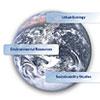Environmental scientists, hydrologists, sustainability experts, urban ecologists, and environmental planners monitor the environment, conserve rare species, control pest species, manage harvested species and investigate sources of pollution and contamination in soil, air, and water, including those affecting health; conduct public education outreach and programs, conduct sustainability assessments; work in green agriculture or green job sectors; conduct community development projects, and work with engineers or planners on environmentally sound projects. They may work in the private sector or may work for state, federal, or local governments.
The main work of environmental scientists and specialists is to predict and analyze environmental problems and develop solutions. Many environmental scientists and specialists work to reclaim lands and waters that have been contaminated by pollution. Others work to increase appreciation and use of public resources, such as urban forests and fishing. Still others assess the risks new construction projects pose to plants, wildlife, and the environment, then make recommendations to governments and businesses on how to minimize the negative impacts of these projects. They also identify ways that human behavior can be changed to avoid problems such as the depletion of the ozone layer and species loss.
The federal government and many state and local governments have regulations to promote clean air to breathe, safe water to drink, and no hazardous materials in the soil. The regulations also place limits on development, particularly near sensitive ecosystems, such as wetlands. Many environmental scientists, government specialists, and environmental scientists from consulting firms work for to ensure that these regulations are followed. Some environmental scientists and specialists focus on environmental regulations that are designed to protect people’s health, while others focus on regulations designed to minimize society’s impact on the ecosystem
Many environmental specialists work in various forms of education, and conduct public workshops, demonstrations, outdoor talks, and other forums to promote wise use of natural resources.
The median annual wage of environmental scientists and specialists was $61,700 in May 2011. The median wage is the wage at which half the workers in an occupation earned more than that amount and half earned less. The lowest 10 percent earned less than $37,850, and the top 10 percent earned more than $107,990.
Most environmental scientists and specialists work full time. In many cases, their work involves substantial time in the field gathering data and monitoring projects. They may have to work long or irregular hours when working in the field.
Professional Activities
- Determine data collection methods for research projects, investigations, and surveys
- Collect environmental data, such as samples of air, soil, water, food, and other materials, for scientific analysis
- Survey for rare and endangered species and work to help them persist and expand
- Identify pest species and help design and implement control measures
- Manage populations of harvested species and promote wise use
- Promote public knowledge, appreciation, and support of urban wildlife and greenspaces
- Manage urban forests and community gardens
- Analyze samples, surveys, and other information to identify and assess threats to the environment and human health
- Develop plans to prevent, control, or fix environmental problems, such as pollution and degradation of land and water
- Develop plans to restore polluted or contaminated land and water for healthy use
- Provide information and guidance to government officials, businesses, and the general public on conflicts with sustainable practices, possible environmental hazards and health risks
- Prepare technical reports and presentations that explain their research and findings
- Meet with public officials, developers, and the public regarding development plans and land use
- Gather and analyze economic and environmental studies, censuses, and market research data
- Conduct field investigations to analyze factors affecting land use
- Review site plans submitted by developers
- Assess the feasibility of proposals and identify needed changes
- Recommend whether proposals should be approved or denied
- Present projects to planning officials and planning commissions
- Stay current on zoning or building codes, environmental regulations, and other legal issues
- Work on organic farms
- Develop green businesses
- Promote advocacy and policy




